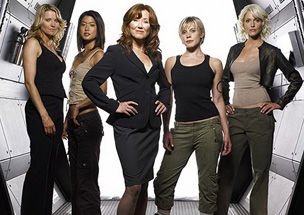Mythology: Battlestar Galactica
By Martin Felipe
July 30, 2009
BoxOfficeProphets.com

Unlike most mythology show runners who claim to have the broad strokes - if not the episode-to-episode details - of their epic planned in advance, Moore and Eick make no bones of the fact that they made up the story as they went along. As a result of this approach, fans have developed somewhat of a love-hate relationship with the show as it entered its later half-seasons. Some plot threads seemed to lead to nothing. Inconvenient early storylines, which interfered with later developments, got pat, unsatisfying conclusions, and certain foreshadowing seemed to have little payoff.
The fact of the matter is that almost every show's final episode is greeted with controversy. Galactica is far from alone in this respect and, in my opinion, despite a quibble here and there, Moore and Eick do stick the proverbial landing. Pretty much all of the dangling threads get some degree of tying, we get closure on the many, many characters, answers to questions, and all the while the themes of survival and faith are preserved. While the show as a whole is brilliant, the conclusion, to me anyway, makes it one for the ages. And yet, a quibble or two remain.
It goes without saying, but I'll say it anyway. I'm about to discuss a few detailed developments of the finale. This is your spoiler warning.
Probably my biggest issue with the finale is the resolution of the Pythian Prophecy. The Prophecy tells of a leader suffering from a wasting disease who will lead a Caravan of the Heavens to the new homeland, but not live to enter it. One of the great rules of mythology storytelling is if there's a prophecy, it must come to pass, even if not in the way we've come to expect.
Now, I've gone over this many times in my head, but if Roslin is the dying leader and the Fleet is the Caravan, then according to the Prophecy, she should not live to enter the new homeland. Yet, she does. I've seen two explanations to this inconsistency which seem to work to some degree. The first is that she dies before reaching her new home with Adama. That's not bad. I could go with such an explanation. It's a semantics issue. She enters the new homeland of the Caravan of the Heavens but not her own.
The other explanation I've heard is that perhaps the dying leader isn't Roslin but Galactica herself. Galactica does suffer a wasting disease, the metal fatigue threatening to render the fleet without FTL in the final episodes. She doesn't make it to the new homeland, as Anders flies her into the sun. Interesting.
I'm not sure if either explanation is conclusive to me, nor do I know if there's a better one out there. Whatever Eick and Moore intended as the meaning of the Prophecy, I don't think it's clear within the context of the show. Perhaps this is their goal. That's fair enough, but I feel unfulfilled. I'll go with the she-dies-on-the-way-to-her-home-with-Adama option for now.
The other issue that bugs me is zombie Starbuck. Kara Thrace dies in season three, only to return several episodes later. Of course, many characters suspect her of being a Cylon, a suspicion which gets debunked. So what is she? We know she has a special destiny according to Leoben (who also incorrectly says that Adama's a Cylon, but I'll let that one go). Leoben's the Cylon who seems to have some knowledge of divinity or destiny, so when he speaks of your fate, you'd best listen.
Well, after punching in the FTL coordinates that bring the fleet to the new Earth, she hangs around for a bit, has one final chat with Lee, then disappears. What's that mean? Is she another angel-like being akin to Head 6 and Head Baltar? That would seem to make the most sense. I think Moore and Eick would have us believe that the two Heads are some sort of divine influence, manipulating the Fleet - and the Cylons - the whole time to get them to Earth. Zombie Starbuck could be just another tool at their disposal, which is what I think is what Moore and Eick intend.
It's just that Starbuck's behavior seems inconsistent with that of Head 6 and Head Baltar. For instance, she's doesn't seem any more aware of her heavenly status than any of the rest of the Fleet. The Head pair have a higher knowledge of what's up, but Post-Death-Starbuck really seems no different from Alive-Starbuck in her knowledge of the divine. For that matter, everyone sees her, while only Baltar sees Head 6 and only Caprica 6 sees Head Baltar. She's corporeal as well. Perhaps Heads 6 and Baltar are too, but as they only interact with their opposing counterparts, we can't really be sure. Chances are, Starbuck is just a tool that the Heads need to complete their goal of getting the Fleet and their Cylon allies to Earth, but there's enough of a gray area that it not only leaves room for interpretation, but it seems only partially thought out.
Again, I dug the finale. I'd go so far as to label it brilliant, a future classic. It's just that Moore and Eick's make-it-up-as-we-go approach does seem to leave us with a few cracks in the structure, much like those in Galactica during her final days. The very fact that these two were able to bring the sprawling thing to such a strong conclusion make me overlook the few dangling unpicked nits I've found. Well, maybe not overlook, but to try to look beyond. When so much is done so well, it does me no good to focus on the minor negatives. So despite these troublesome niggles, I'm gonna go watch the DVDs now.